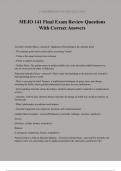©THEBRIGHTSTARS 2024/2025
MEJO 141 Final Exam Review Questions
With Correct Answers
Aristotle's Golden Mean - answer✔- Happiness (flourishing) is the ultimate good
- The ultimate good can be achieved by exercising "virtue"
- Virtue is the mean between two extremes
- Virtue is relative to situation
- Golden Mean: The golden mean or golden middle way is the desirable middle between two,
one of excess and the other of deficiency
Plato and Aristotle Picture - answer✔- Plato's right hand pointing to the heavens and Aristotle's
hand gesturing down to earth
- Plato is carrying his book Timaeus, a sophisticated treatment of space, time, and change,
including the Earth, which guided mathematical sciences for over millennium
- Int he painting Aristotle carries his Ethics, which he denied could be reduced to a mathematical
science
- Aristotle, with his four elements theory, held that all change on Earth was owing to motions of
the heavens
- Plato's philosophy was abstract and utopian
- Aristotle's approach was empirical, practical, and commonsensical
Golden Mean Examples - answer✔Deficiency (cowardly, lethargic, secretive, apathetic)
Excess
(Reckless, selfish, blatant, insensitive)
Balance
(Courageous, industrious, honest, empathetic)
Patterson Intro to Ethical Decision Making - Aristotles Golden Mean - answer✔For Aristotle, the
highest virtue was citizenship, and its highest practitioner the statesman, a politician who
, ©THEBRIGHTSTARS 2024/2025
exercised so much practical wisdom in his daily activity that he elevated the craft of politics to
art
Golden mean (Media Application) - answer✔- Instead of totally banning all tobacco advertising
or deciding not to regulate it at all, the FTC chose a middle ground
- The FTC banned cig ads from TV and required that warning labels be included in print ads on
cigarette packs
Immanuel Kant's Categorical - answer✔- Act as if the choices you make could become universal
law
- Treat each individual as an end and never as merely a means ("Do unto others as you would
have others do unto you")
- Ethics is absolute and lies in the act not individual
- Categorical Imperative: an unconditional moral obligation which is binding in all circumstances
and is not dependent on a person's inclination or purpose
Categorical Imperative: - answer✔For Kant moral acts are duty and must be carried out at all
time regardless of situation
- Strict duties: Not to murder, not to lie, not to break promise
- Meritorious duties: Help others, show gratitude, develop one's talents
Categorical Imperative Media Applications - answer✔- Journalists can never lie or invade
someone's right to privacy to get a story
- Deception by advertisers to sell a product is always wrong
- Dishonesty in public relations is never right even if telling the truth hurts the company's
reputation
Categorical Imperative (Kant) - answer✔Kant teaches the Categorical Imperative, which
encourages people to act as if what they do will become a universal law
Utilitarianism - answer✔- Happiness (pleasure) or absence of pain is the only moral end
- The consequences of actions are important in deciding whether they are ethical
- Utilitarianism is a family of normative ethical theories that promotes actions that maximize
happiness and well-being for all affected individuals
- the most moral acts are those which maximize happiness (pleasure) for the most number of
people and minimize pain
- In Utilitarianism, the outcome determines whether an act is moral "the need of the many
outweigh the few"
, ©THEBRIGHTSTARS 2024/2025
Utilitarianism Media Applications - answer✔The Principle of Utility would suggest that it's
acceptable to lie to get a story if it results in the greater good for society, that is if more people
are helped by uncovering the information than are hurt by the lie to get the information
Principle of Utility - answer✔Mill teaches the Principle of Utility, which seeks the greatest good
for the greatest number of people
Ethical or Value Pluralism - answer✔- Good is an objective quality
- Right is an action derived from correct reasoning
- A right action may, or may not, be good
- A right action is our duty
- Ethical pluralism (also known as value pluralism or moral pluralism) is the idea that there are
several values which may be equally correct and fundamental, and yet in conflict with each other
Ethical or Value Pluralism - answer✔- Prima Facie ["at first appearance"]: Duties that seem right
because of the nature of the act : returning a found wallet
- Duty Proper: Duties that are paramount and should be carried out given the circumstances :
fidelity, reparation, gratitude, justice, beneficence, self improvement, and not harming others
Prima facie principles - answer✔- the four prima facie principles are respect for autonomy,
beneficence, non-maleficence, and justice
- Prima facie approach: English philosopher W.D. Ross introduced the "Prima facie," [at first
appearance] the principle as binding unless it conflicts with another moral principle. If it does we
have to choose among them.
- This approach presents a common set of moral commitments, a common moral language, and a
common set of moral issues to choose between these principles when they conflict
- Criticism of prima facie approach: it doesn't provide a method for choosing the right path, a
source of dissatisfaction to people who suppose that ethics merely comprises a set of ordered
rules
Ethical pluralism - media application - answer✔- This idea works well for media professionals
who must balance competing roles
- Ex: A PR professional who wants to tell the truth but also wants to minimize harm to his or her
employer must weigh those competing duties when faced with a news reporter asking about a
company scandal
Communitarianism - answer✔- Views people not as individuals but as members of a community
- Actions are evaluated based on their impact on the community as a whole




